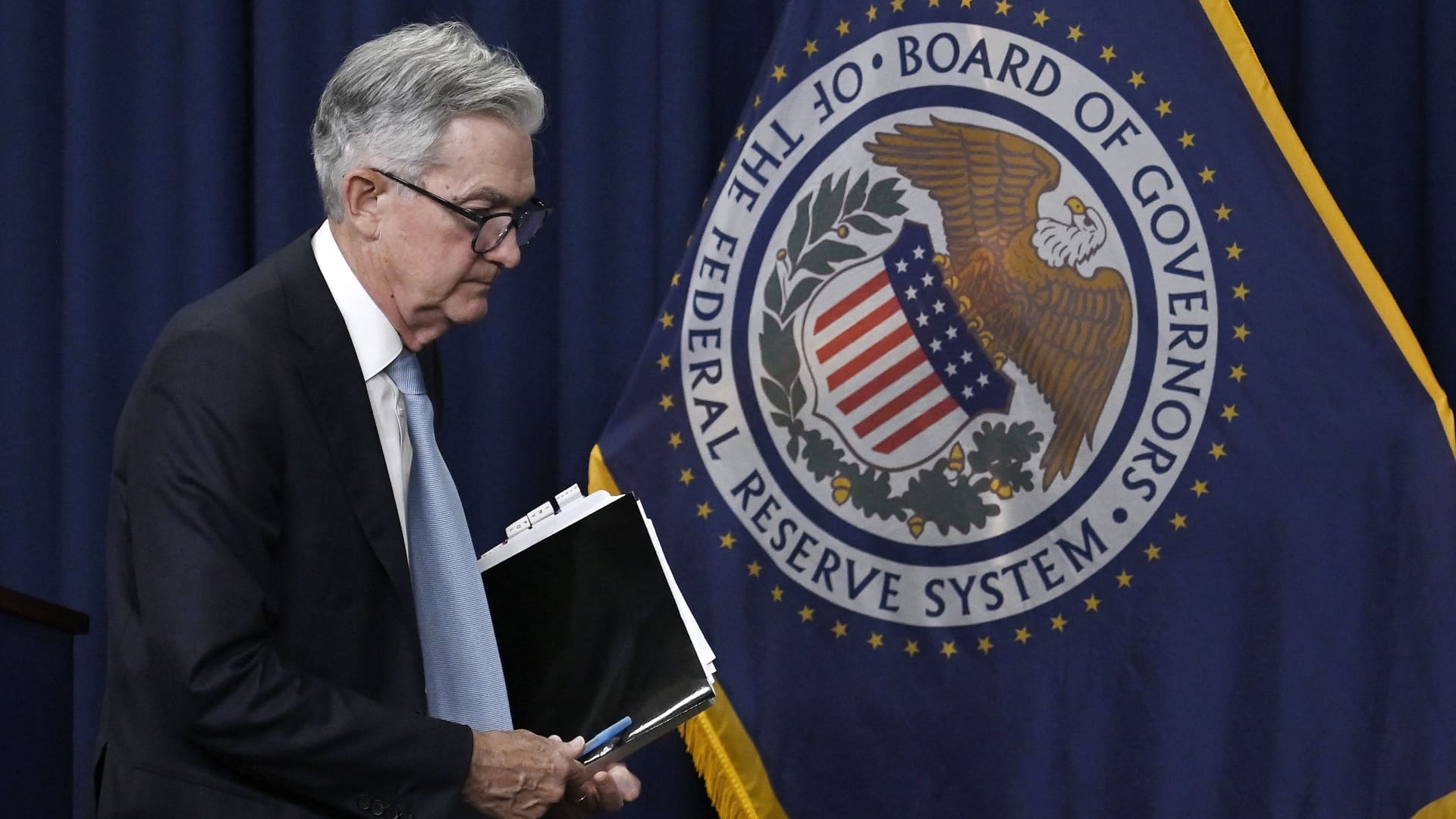
Some central bank watchers believe the Fed and the ECB will have to stop their tightening cycles because of an upcoming recession.
Olivier Douliery | AFP | Getty Images
Central banks around the world might have embarked upon a path of aggressive rate hikes — but not everyone is expecting this approach to last.
The U.S. Federal Reserve and the European Central Bank are among those seeking to tamper record inflation with rate hikes. The Fed increased its benchmark interest rate by 75 basis points to a range of 1.5%-1.75% in June, and Chair Jerome Powell has indicated there could be another similar move in July.
Most market participants expect the hikes to continue until at least the end of next year. But not everyone agrees.
“Can you really hike interest rates into a recession even if inflation is high? That would be unusual,” Erik Nielsen, global chief economist at UniCredit, told CNBC Tuesday.
“There is a very high chance the Fed ends up cutting rate towards, sort of, the end of next year or something, and this is the recession story again.”
His comments come amid growing concerns that both the U.S. and euro zone economies could be facing a recession. Earlier this month, the World Bank slashed its global growth forecast and warned that the economy risks slipping into a period of stagflation reminiscent of the 1970s.
If this happens, some analysts say that continued rate hikes next year are untenable and risk hitting the economy even harder.
Indeed, Michael Yoshikami, founder of Destination Wealth Management, says it could spark rate cuts as early as this year.
“Inflation is runaway right now. The Federal Reserve is going to bring out these multiple very, very strong signals that they’re looking to control inflation, it is going to dip the economy into a slow growth, stagflation or a recessionary environment and then I think the Fed going to start cutting rates again later on this year,” Yoshikami told CNBC Thursday.
“If the Federal Reserve moves us closer towards recession and breaks the back of inflation and has to cut a little bit to simulate the economy, I don’t think that’s necessarily a bad thing.”
This reversal is not, however, the base case of the Federal Reserve.
When asked if the U.S. would see rate cuts next year because of a potential recession, Loretta Mester, president of the Federal Reserve Bank of Cleveland, said Wednesday: “I don’t see that in my baseline, but again, we’re just going to have to assess economic conditions on the ground as we go forward.”
She does not expect the U.S. economy to enter a recession — commonly viewed as two consecutive quarters of economic decline — but does see growth slowing this year.
But for some market players, and indeed corporates, a recession is in the cards. In fact, Cathie Wood, Ark Invest CEO, told CNBC Tuesday that the U.S. in already in a recession.
The closely-watched Fed GDP tracker is also indicating that the U.S. economy is heading for a recession. The Atlanta Fed’s GDPNow tracker now points to a 1% contraction for the second quarter, following a 1.6% slide in GDP in the first three months of the year
This potential halt in growth is why Berenberg economists expect the Fed to start cutting rates late next year. They see the Fed’s key rate peaking at a range of 3.5%-3.75% in the first half of 2023.
“We project that the Fed will then pause and lower rates in response to lower inflation and recessionary conditions – including a marked rise in unemployment from Q4 2023 onwards – to a range of 2.75-3% for the Fed funds rate by late 2024,” they said in a note on June 21.
In the “slow-moving” ECB’s case, they said it will “likely stop hiking upon reaching a 1% refinancing rate in December 2022 and stay on hold at that still very low level in 2023 and 2024.”
The ECB has so far confirmed its intention to hike rates in July, its first in 11 years, and then again in September.
Speaking to CNBC Wednesday, ECB Governing Council member Robert Holzmann said there is plenty of room to keep raising rates post-September.
“We will have to make an assessment where the economic development is going and where inflation stands and afterwards there’s ample room to hike in 0.25 and 0.5 levels to whatever rate we think, we consider reasonable,” Holzmann, who is also the governor of the Austrian central bank, said.
Berenberg forecasts a contraction in GDP of 0.4% for the U.S. in 2023, and a 0.8% contraction for the euro zone.




